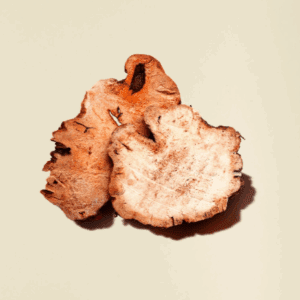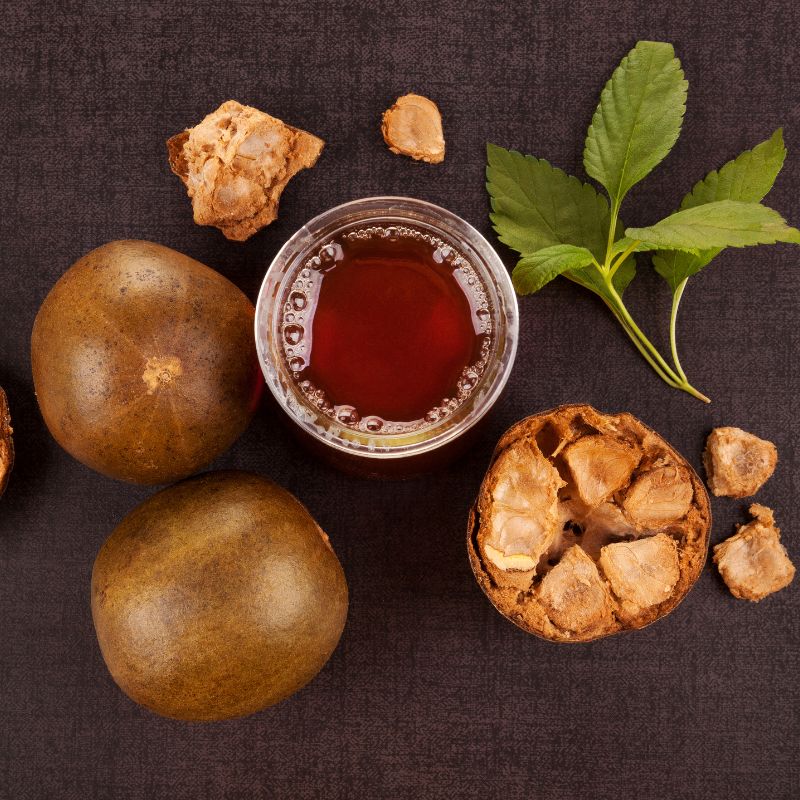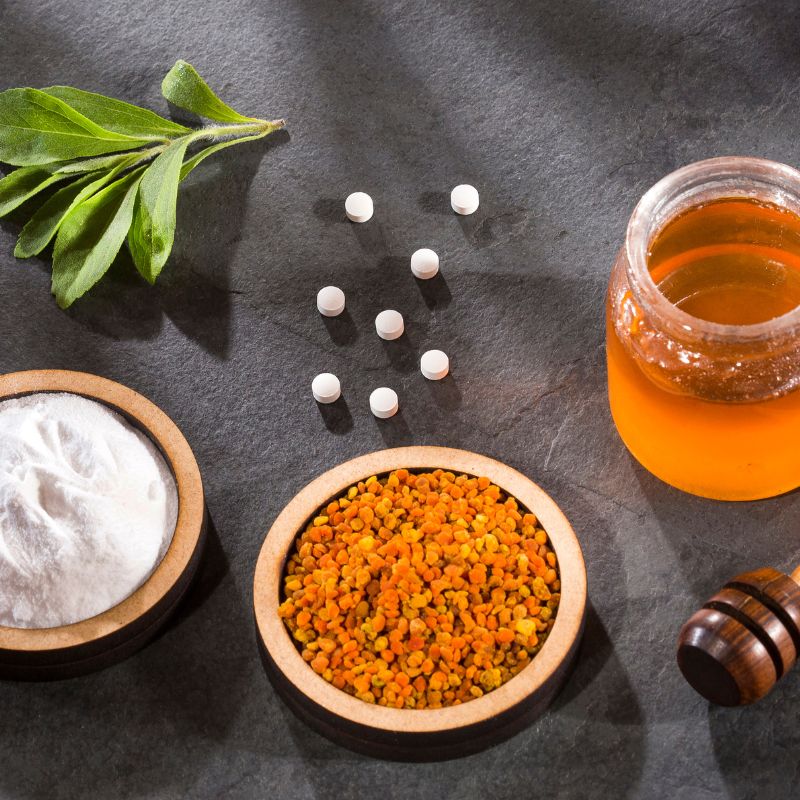
PORIA (Fu Ling) Mushroom: Boosts Digestion, Balance Energy, Support Spleen
There are herbs and mushrooms that make waves in the

Kick-start, energise, rejuvenate
All carefully planned and prepared to help nourish, reset and rejuvenate the body and mind.

Monkfruit has been cultivated in China under the name “lo han guo” for centuries as a medicinal herb. But it is only in the past few years that the fruit has been “discovered” by the Western world and monk fruit sugar substitute has risen in popularity. At first glance, monk fruit sugar seems like the perfect sweetener; it’s healthy, tastes great, and has no negative health effects. In this post, we’ll take a look at whether the miraculous substitute is as good as it sounds.
Monk fruit, scientifically named Siraitia grosvenorii, is a perennial vine native to Southern China and northern Thailand. It belongs to the gourd family, Cucurbitaceae, and is revered for its intensely sweet flavour, which comes from natural compounds called Mogrosides. Unlike sugar monk fruit extract contains zero calories and does not spike blood sugar levels, making it an excellent option for those looking to reduce their calorie intake and those monitoring their blood sugar levels. It is keto-friendly and paleo-friendly [1].

Monk fruit sweetener is an extremely sweet powder that has nearly an identical texture and color to traditional cane sugar – grains of slightly transparent off-white. They harvested and sold the fruits for their purported health benefits, which gives you some idea of how much better for you monk fruit sweetener is than the sugar you’re probably used to.
Monk fruit is juiced before being mixed with a bit of water to create a monk fruit extract. The monk fruit extract can be dried into a powder known as monk fruit sugar or monk fruit sweetener.
In traditional Chinese medicine, monk fruit has been used for its cooling properties and to treat various ailments, including sore throat, cough, and digestive issues. Its sweet taste also earned it a place in Chinese culinary traditions, where it was used to sweeten teas, soups, and medicinal concoctions [2], [3].

Originally, the juice and powder of the “lo han guo” was used for its healing properties. Traditional Chinese medicine advises that they’re good for intestinal issues and colds. We can’t vouch for those specific benefits, but some of the health benefits of monk sugar that have been confirmed include:
Monk fruit sweetener does not raise your blood sugar level nearly as quickly as cane sugar does. After being consumed, the carbs in monk sugar break down very gradually, giving your body time to digest and absorb the sugars properly.
Antioxidants like monk sugar help to fight “free radicals,” toxins in your body that can lead to serious issues like cell death or cancer if left unchecked.
As mentioned, monk sugar breaks down slowly in your body. Because of that fact, it does not cause blood sugar spikes.
Monk fruit sugar substitute does not contain any calories, making it a great option for those looking to lose weight or improve overall health while still consuming their favorite sweet foods.
The compounds known as “mongrosides” in monk fruit sugar have anti-inflammatory effects. That means they help prevent a myriad of health issues from acne to cancer.
Even though it’s called monk fruit “sugar,” it doesn’t actually have sugar in it. That means it won’t contribute to tooth decay nearly as much as cane sugar will.
You may be telling yourself that you’ve heard this story before. There are lots of sweeteners out there, both natural and artificial, that claim to be a worthy replacement for sugar. Let’s take a look at how those other sweeteners stack up to monk fruit sugar substitute, though [4].

Read more: 10 Simple Blood Sugar Management Hacks + Blood Sugar Stabilising Herbs
Monk fruit and Stevia are both natural sweeteners that come from dried and powdered plants. Neither of them contain calories, making them good for weight loss. And they’re both much sweeter than cane sugar, with monk fruit extract being about 150x as sweet and Stevia being about 250x as sweet. That’s where the similarities end, however.
Stevia has been associated with several side effects. They include bloating, nausea, and gastrointestinal issues. Monk fruit sugar, on the other hand, has no known side effects.
The taste of stevia is another large issue. Many people find it to have a bitter aftertaste, while others say it has a sickeningly sweet quality. Monk fruit has a fruity taste that some people complain is not as neutral as the more “pure” taste of cane sugar.
All in all, Stevia is one of the better alternative sweeteners to choose if you don’t have access to monk fruit sugar substitutes.
Unsurprisingly, consuming artificial sweeteners is worse for you than sticking to the natural stuff: monk fruit or even Stevia [5].
Artificial sweeteners are chemically altered to be hundreds or even thousands of times as sweet as sugar, meaning that you don’t need to use much. The most popular artificial sweetener, aspartame, is even calorie-free just like monk fruit sugar, and many other artificial sweeteners have almost no calories because of how little you need to consume.
Unfortunately, artificial sugars are known to cause plenty of negative side effects, such as cancer, diabetes, and intestinal issues. They do not regulate blood sugar like monk fruit does and they certainly don’t have any medicinal effects like the ones the Chinese discovered monk fruit to have hundreds of years ago.
One of the greatest advantages of monk fruit sugar substitute is how well it simulates the properties of sugar during cooking. Let’s take a look at some of monk fruit sugar’s uses in the kitchen.
Monk fruit sugar is completely heat resistant, unlike artificial sweeteners that lose their sweetness when heated. Because of that, feel free to substitute it into any recipe you’re making that calls for sugar.
When you make the substitution, remember that the sugar made from monk fruit extract is much sweeter than normal cane sugar – between 150 and 250 times as sweet, in fact. Despite that ratio, however, we’d recommend using either 1 teaspoon or 1 tablespoon of Shoku Iku’s monk fruit extracts for every 1 cup of sugar in a recipe, depending on which concentration of monk fruit extract you have [6].
If possible, start by adding only a little monk fruit sugar and taste the food yourself as you gradually add more. Stop when it tastes right. Make sure to mix the monk fruit sugar into the recipe well, because a clump of pure monk fruit sugar will probably be overly sweet.
Monk fruit sugar dissolves even better than cane sugar in beverages! Like traditional sugar, it will dissolve even more quickly in warm drinks. If you’re adding it directly to a cold drink, though, just make sure to stir it thoroughly. Like in recipes, we’d recommend starting by adding 1 tablespoon of monk fruit sugar to start and gradually adding more if needed.
Shoku Iku offers monk fruit extract sugar in two concentrations: pure monk fruit extract and 10:1 monk fruit extract. If using monk fruit pure, we’d recommend substituting 1 teaspoon for every 1 cup of sugar. If using 10:1 extract, substitute 1 tablespoon of monk fruit for every 1 cup of sugar. Use either of them as a way to eat healthier while keeping your favorite treats in your kitchen!
What should you consider before adding monk fruit sugar substitute to your pantry?
As long as you’re using pure monk fruit sugar that hasn’t been mixed with any other sweeteners, it won’t affect digestion in the vast majority of cases. In fact, traditional Chinese medicine suggests monk fruit is great for the digestive system!
That being said, some people are allergic to monk fruit. It’s rare and the reaction won’t cause anything more than an upset stomach and gas, though.
Read more: Digestive Support
Monk fruit sugar is still a fairly new product in Western countries and is not even available in many of them. Luckily, monk fruit has been common in East Asia for centuries, and Australia is not too far away. So Shoku Iku has access to the good stuff. It’s naturally more expensive than cane sugar, but what can you expect when you’re dealing with a product that has so many advantages over any other sweetener, natural or artificial?
We offer two monk fruit products, each catering to different preferences. Whether you seek a dependable low-calorie sweetener or desire additional health benefits, we have options for you.
Luo Han Guo contains mogrosides with a zero glycemic index, providing sweetness without adding calories, making it suitable for diabetics. The sweetness stems from mogrosides, constituting approximately 1% of the fruit by weight.
Our Luo Han Guo 80% extract is obtained through water extraction without the use of organic solvents or resins. It contains no fillers or preservatives, ensuring pure monk fruit extract. With a consistent extraction of mogrosides, it serves as a reliable sweetener.
1 teaspoon of this monk fruit is equivalent to 1 cup of sugar.
Standardised extracts maintain an extract ratio determined by the concentration of active compounds in the original herb compared to the final extract. A 10:1 extract ratio means the extract contains ten times the unique active compound found in dried monk fruit. This option preserves the natural composition of the fruit, though taste and sweetness may vary between batches, potentially exhibiting a more herbal aftertaste.
1 tablespoon of this monk fruit is equivalent to 1 cup of sugar.
Blend all the ingredients together and split the mixture into three portions.
Colour one with turmeric, another with Blue spirulina and leave the third portion as it is.
Swirl the mixture and pour it into ice cream popsicle moulds.
Freeze and when ready dip them in melted chocolate. Sprinkle some chopped nuts on top.

Reference:

There are herbs and mushrooms that make waves in the

Few herbs are as revered in Traditional Chinese Medicine (TCM)

For centuries, He Shou Wu (何首乌), also known as Fo-Ti
Copyright Shoku Iku © 2024 | All Rights Reserved.
The statements on this website have not been evaluated by the TGA or FDA. These products are not intended to diagnose, treat, cure or prevent any disease.
Sign up to receive your discount.